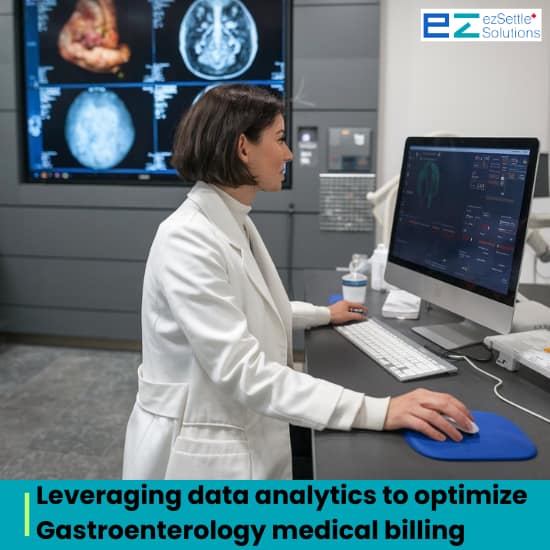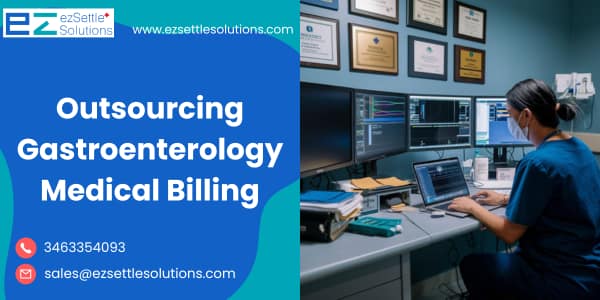
In healthcare, the difference between thriving and merely surviving often lies in how well you utilize data.
Gastroenterology practices face unique challenges in medical billing, from navigating complex procedure codes to ensuring accurate reimbursements. Without streamlined processes, revenue leakages can significantly impact practice growth.
Enter data analytics- a transformative solution that allows gastroenterology providers to identify inefficiencies and turn billing operations into a strategic advantage.
This blog will explore how data analytics can optimize gastroenterology medical billing efficiency, reduce errors, and enhance practice profitability.
Data analytics involves collecting, analyzing, and interpreting billing and operational data to identify trends, inefficiencies, and opportunities for improvement.
In gastroenterology medical billing, this means leveraging insights to streamline processes such as:
Claim denials are a significant challenge in gastroenterology medical billing, often resulting from coding errors, missing documentation, or payer-specific requirements.
“American Medical Association stated that physicians’ practices annually cost $15,000 per denial claim per physician.”
Data analytics helps identify patterns in denied claims by analyzing historical billing data.
For example, it can pinpoint common reasons for denials, such as incorrect CPT codes for endoscopic procedures, and suggest corrective actions.
Organizations using analytics-driven denial prevention strategies have seen a 20-30% reduction in claim denials.
This proactive approach not only improves revenue collection but also reduces the administrative burden of reworking claims.
Clean claims submitted without errors or the need for additional information are critical for ensuring timely reimbursements. Data analytics tools analyze the factors that contribute to clean claims, such as accurate coding and documentation.
Gastroenterology practices that implement analytics solutions often experience a 10-15% increase in clean claim rates, leading to faster payments and improved cash flow.
By minimizing errors before claims are submitted, practices can significantly reduce the time and cost associated with rework.
Accurate coding is essential for gastroenterology medical billing due to the complexity of procedures like colonoscopies, endoscopies, and biopsies. Data analytics helps identify coding errors and compliance risks by comparing submitted claims with industry benchmarks and payer guidelines.
For example, analytics can flag discrepancies in commonly used CPT codes or mismatched ICD-10 codes. This ensures compliance with regulations and reduces the likelihood of audits or penalties.
Delayed reimbursements can disrupt a practice’s financial stability. Data analytics tracks payment trends and payer performance, providing insights into the average time taken for claim processing. Armed with this data, gastroenterology practices can renegotiate payer contracts to reduce delays.Advanced analytics solutions also automate follow-ups for pending claims, helping reduce accounts receivable (A/R) days by 20-30%.
Faster reimbursements translate directly to improved cash flow, enabling practices to invest in growth and patient care.
Data analytics empowers gastroenterology practices to shift from a reactive to a proactive approach in managing denials. By analyzing real-time data, practices can identify denial trends early and implement preventive measures, such as staff training on common coding errors or upgrading billing software.
Automation tools integrated with analytics can also streamline tasks like eligibility verification, reducing the likelihood of claims being rejected for avoidable reasons.
Beyond billing, data analytics improves operational workflows in gastroenterology practices. It provides insights into staffing needs, patient scheduling, and resource allocation. For example, practices can analyze appointment data to reduce scheduling gaps or ensure optimal staffing during peak hours, indirectly improving billing accuracy and efficiency.

A gastroenterology practice that struggled with high denial rates for colonoscopy procedures.
By partnering with EZ Settle Solutions, they discovered that many claims were denied due to missing modifiers.
To address the client’s billing inefficiencies, we at EZ Settle Solutions introduced a comprehensive data analytics-driven approach such as data analysis, corrective measures, and automation integration.
After the implementation of all corrective measures and automation claim reviews, the result was shocking.
That gastroenterology practices achieved a 25% reduction in denial and shortened its A/R days by nearly a week.
Modern billing software comes with built-in analytics tools that provide actionable insights. These tools can automate routine tasks, such as eligibility verification and claim scrubbing, freeing up staff to focus on value-added activities.
Predictive analytics can forecast trends, such as seasonal surges in patient volume or changes in payer policies. This allows gastroenterology practices to prepare in advance, minimizing disruptions to billing processes.
Tracking KPIs such as denial rates, first-pass acceptance rates, and days in accounts receivable helps practices measure the effectiveness of their billing operations. Regular reviews ensure that the team remains aligned with performance goals.
| KPI’s | Description | Why It Matters? |
| Denial Rates | Percentage of claims denied by payers. | Measures effectiveness of denial prevention strategies. |
| Clean Claim Rate | Percentage of claims submitted without errors. | Higher rates indicate fewer delays and faster reimbursements. |
| Days in Accounts Receivable (A/R) | Average number of days to collect payments. | Shorter A/R days translate to improved cash flow and financial stability. |
| First-Pass Acceptance Rate | Percentage of claims paid on the first submission. | High rates reflect accuracy in coding and documentation. |
Even the most advanced analytics tools are only as effective as the people using them. Training staff on how to interpret and act on data insights ensures that analytics becomes a core part of billing operations.
While the benefits are clear, adopting data analytics in billing does come with challenges:
By partnering with a medical billing expert like EZ Settle Solutions, gastroenterology practices can overcome these hurdles with ease.
Data analytics helps identify inefficiencies, reduce claim denials, streamline coding, and improve cash flow, enhancing overall billing efficiency.
By analyzing historical billing data, it identifies common denial reasons, enabling practices to implement preventive measures like accurate coding and documentation.
Denial rates, clean claim rates, days in accounts receivable, and first-pass acceptance rates are crucial for measuring billing performance.
Yes, it flags coding errors and mismatches with payer guidelines, ensuring regulatory compliance and reducing audit risks.
EZ Settle Solutions integrates advanced analytics tools to streamline billing, reduce errors, and maximize reimbursements for gastroenterology practices.
Gastroenterology medical billing that adopts a data-driven approach to billing not only reduce errors but also position themselves for sustainable growth. With the right tools, strategies, and partners, your practice can achieve unmatched billing efficiency and financial success.
Make data your ally-start optimizing your billing operations with EZ Settle Solutions today!
With EZ Settle Solutions integrate data analytics into your revenue cycle, ensuring accuracy, compliance, and maximum reimbursements. Our team of experts helps you harness the full potential of your billing data, turning insights into actionable strategies.
Contact us at 346-335-4093 or info@ezsettlesolutions.com for a free consultation.